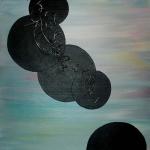One of the interesting things about learning jazz piano, and jazz theory in general, is how all the theory starts to feel inter-related after a while.
Most jazz piano books, and Mark Levine's is no exception, seem to take the tack of throwing a bunch of data at you and hoping it sticks. I've had a little trouble with that so far. For instance, I put a lot of pressure on myself to start trying to memorize jazz standards about eight months ago, and I got discouraged really fast. I just felt like I was trying to drill myself and none of it was sticking. I was missing glue.
I've learned a lot about learning in my days of memorizing classical piano pieces. The main thing is that you can't memorize something in only one way. If you memorize simply by muscle memory, then it requires a huge amount of focus to stay in the brainspace to rely on only that when you're performing. It's the same with memorizing by ear - what if you have a brain lapse and forget how something is supposed to "go" next? But if you can memorize it in five different ways, you've got redudancy - you've always got a fallback. I would always try to memorize in as many ways as possible - muscle memory by playing the piece on a table. Ear, by playing through the whole piece in my mind when falling asleep in bed. Visually by trying to photographically memorize the score, and also by visually memorizing what the piano keys looked like - and finally, analytically with harmonic relations, how the chords changed from a theory perspective.
Basically, what matters is not really the data, but how linked it is. And that is what makes jazz theory so difficult for beginners, and then so much more weirdly easy once you really get going. What matters is how much glue you have.
I had a few brainbending moments yesterday while practicing. For a while I've been stuck in the phase of improvising diatonically, with a few blues scales mixed in. But as soon as it would get into things like the more interesting scales one could play for the more interesting chords, I wouldn't know how to link that together in my head.
Two good examples are the octactonic scale and the alt scale.
I've known the octatonic scale (aka the half-dim scale) for a long time, from a theoretical perspective. Half-step, whole-step, half-step, whole-step. But that bit of knowledge is basically meaningless to me. It's like all I could do was either struggle through playing the mental pattern (while the visual pattern is so different from key to key), or drill myself to learn it with muscle memory. I didn't see any other way to look at it other than it being two of the three dim-7 chords clustered together - and I don't make a practice of looking at scales as clustered chords while I'm trying to play scales, so that wasn't helpful. And some people define the half-dim scale as starting with the whole step, which just confuses the issue.
So this week my teacher (Tony Pacini) got me working on quartal chord voicings, and one of the most common ones is the dom7 voicing that starts on the 7 and goes up by tritones and fourths. In F: Eb, A, D, G, C, F. And we were also talking about tritone substitution, and how basically any voicing of dom7 chord works over the root or the note a tritone away from the root. And he also made the point that you really only have to think about the octatonic scale that starts with the half-step.
So here were the brainbending moments:
- While I don't know the half-dim/octatonic scale, I do know my modes. The two most common are Lydian (raised fourth; film scoring, Grieg, John Williams), and Mixolydian (lowered seventh; it's all over the place). If you combine them, you have a lydian-mixolydian scale, with both a raised 4 and a lowered 7. I've always loved that sound. While playing with the half-dim scale that starts with the half-step, it started to look and sound familiar. It turns out that the half-dim scale is just a lydian-mixolydian scale, with a crunched up beginning (instead of a 2, you play the notes on either side of the 2). And that made it click. All of a sudden, I can now play it in every key.
- That lydian-mixolydian scale shows up elsewhere, too. Take the above dom7 voicing and crunch it down to within one octave, over the tritone root (B natural). B, C, D, Eb, F, G, A, B. What's that? That's the alt scale. What is that over its original root? F, G, A, B, C, D, Eb, F. The B isn't actually in there, but you have to use a #11. That's the lydian-mixolydian scale. Yes, in other words, the alt scale is always the lydian-mixolydian scale, starting on the tritone.
- I liked looking at the half-dim scale as being like the lydian-mixolydian, but with a crunched-up beginning. So what's another way of looking at the alt scale? It turns out it is like a whole-tone scale, except with a crunched-up beginning. Again, instead of the 2, it's the notes on either side. It's like it's half a half-dim scale, and then half a whole-tone scale.
I guess that was a productive few minutes when that all clicked together for me.


